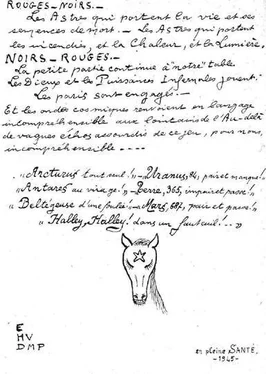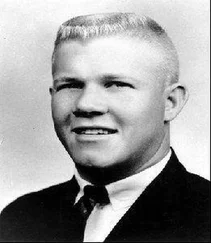The Wehrmacht, the Luftwaffe, the Kriegsmarine, the SS, and other elite Nazi officers and selected collaborators, meanwhile, were enjoying their own day in the sun. It was a sumptuous world far removed from the privations of everyday life replete with shortages and regular power outages. The officers were also avoiding the carnage of the Eastern Front: sipping champagne in the silk-lined suites of the Crillon or at the Ritz, dining by candlelight under the chandeliers of Palais du Luxembourg; and of course enjoying the fashionable soirees at the German embassy hosted by its Francophile ambassador, Otto Abetz. The spectacle of his social events prompted Céline to dub him King Otto I.
Germany’s waning fortunes in war, if anything, strengthened the desire of its officers and soldiers to enjoy Paris. German officers were regular visitors to the cabarets and brothels. Madame Fabianne Jamet (real name Georgette Pélagie) remembered them at hers, One Two Two, with fondness: handsome young SS men showing perfect manners; Wehrmacht soldiers shouting “Heil Hitler” as they raised their champagne glasses; Luftwaffe pilots coming in for a last drink and fling before embarking on a bombing mission in the Battle of Britain. She recalled the latter passing around a tube of a stimulant designed to increase their concentration and confidence to face the Spitfires and anti-aircraft guns, and confessed that she started using the drug herself.
The French criminal gangs, on the other hand, were “horrible creatures.” The gangsters in their fashionable jackets bulging with concealed weapons would lounge around downstairs with their women, “emptying magnum after magnum and boasting to one another about their exploits.” Worse, they were unpredictable and often unruly, like the hooligan who got drunk and started juggling hand grenades. These “vile, disgusting thugs,” Jamet added, “threw their money about on champagne and girls as though there was no tomorrow.”
16.
THE ATTIC
I CANNOT SAY WHO I AM. STILL YOU KNOW ME.
EVERYONE KNOWS ME. IF I WERE TO TELL YOU MY NAME,
YOU WOULD BE TERRIFIED.
—Marcel Petiot to FFI Lieutenant André Rolet
DETERMINED to catch the killer, Commissaire Massu was dreaming of the moment he would place the handcuffs on Marcel Petiot. He would show the suspect to his seat near the window overlooking the green square below, offer him a cigarette, and then launch into what he called “the most passionate interrogation of [his] entire career.” By the end of this battle of wits, he would be able to put together the many loose pieces of the puzzle and ensure that cruelty, malice, and deviousness on such a horrific scale would not go unpunished.
But far from being close to a resolution, the case seemed only to be expanding. After François the Corsican and Jo the Boxer had “passed” to the new world, as it was called, news of the escape organization had circulated around rue de l’Echiquier and the many cafés, bars, and other hot spots of Faubourg Saint-Martin. Soon Pintard was approached by several of Jo’s associates, including the notorious gangster Adrien Estébétéguy, known as “Adrien the Basque,” “The Cold Hand,” or “The Right Hand.” A forty-five-year-old from Bayonne, Adrien had worked much of southwestern France, particularly Toulouse, racking up some eight prison sentences and seven current warrants for arrest, not to mention a string of assault charges over the years, four of them recently, against French policemen.
Packing two standard automatics, which he was said to draw at the slightest dispute in a poker game, Adrien had a reputation as a tough guy with a biting wit and a penchant for fine clothes. He particularly liked new suits, this at a time when one on the black market cost the equivalent of the annual salary of a ticket collector on the métro.
By early 1943, Adrien the Basque had many reasons for wanting to leave France. As part of his work with the Devisenschützkommando, an outfit that tracked down people selling currency and gold illegally, a highly profitable enterprise virtually annexed by Henri Lafont’s criminal gang, Adrien was accused of reselling for personal profit some of the gold he seized and then turning in an inferior gilt substitute. He was apparently making significant omissions in his reports of confiscated goods.
Some of the unreported profits probably also came from his work with Kurt von Behr of the Einsatzstab Reichsleiter Rosenberg (ERR) office, which was removing art and cultural property from “ownerless” Jewish homes. Adrien was involved in particular in the Möbel Aktion , or “Furniture Operation,” that involved retrieving furnishings in apartments where Jews had been deported, and then sending the loot to newly formed German administrations in the east. Later, after the Allied bombing of Cologne on the night of May 30, 1942, ERR authorities changed the stated mission, claiming that the seized property would be used to compensate German victims of the air raids. By the end of the Nazi Occupation, some thirty-eight thousand apartments in Paris alone would be looted by this organization.
Adrien the Basque was guilty of yet other omissions. Like Jo the Boxer, he had been using his German security identity card (a Sicherheitsdienst , or SD, card) and Gestapo uniform to impersonate a policeman and commit a number of robberies. This kind of crime, unfortunately, was on the rise. Approximately one thousand cases of false Gestapo agents were known, many of them targeting the most exposed residents with the least recourse, such as foreign-born Jews or small-time black marketers believed to have hidden away cash. Profits could be substantial. And Lafont was not one to tolerate being defrauded, or insulted, by men in his gang.
Adrien needed to leave Paris in a hurry, but he did not want to travel alone. He recruited one of his subordinates to join him: Joseph Didioni Sidissé Piereschi, known variously as Zé, Dionisi, or Joseph the Marseillais. This surprisingly handsome man, with a scar two inches long and one inch wide running from the base of his nose to his left cheek, came from a similar background. He had been imprisoned at age eighteen for his first murder. During World War I, he deserted twice and progressed to other crimes, such as stealing military supplies and selling arms on the black market. By the fall of 1940, he had been released from the Marseille prison by the Germans, and he soon began running a series of brothels for German soldiers.
As with Jo and François before them, Adrien and Zé brought along their mistresses. Adrien’s was Gisèle Charlotte Rossmy, a petite brunette, aged thirty-four, who had worked as a typist and performed on stage as “Gine Volna.” Zé sported Joséphine, or Paulette, Grippay, “La Chinoise,” a star from an exclusive brothel in Marseille and a recent arrival in Paris. Planning to open a new brothel in South America, they were believed to have carried some 800,000 francs in cash.
The gangsters again traded lovers to ensure honesty. On the last Sunday of March 1943, Adrien left with Paulette; a few days later, Zé followed with Gisèle. The group used a sign for communicating their safe arrival in Argentina: they took a 100-franc note, drew a flaming sun on it, and ripped it into two, each group taking a half. Adrien and Paulette would send their piece back through the organization to prove that they had arrived in South America. Not long after their departure, Petiot handed Fourrier the half note. “My men got them through,” he said.
In March 1944, Massu’s detectives found the other half of the note in a drawer at Petiot’s office on rue Caumartin.
PETIOT’S closest friend, the forty-nine-year-old René Nézondet, was now brought into custody. Tall and slender, with his dark hair slicked back over his high forehead, Nézondet had known Petiot longer and arguably more intimately than anyone else outside his family.
Читать дальше












